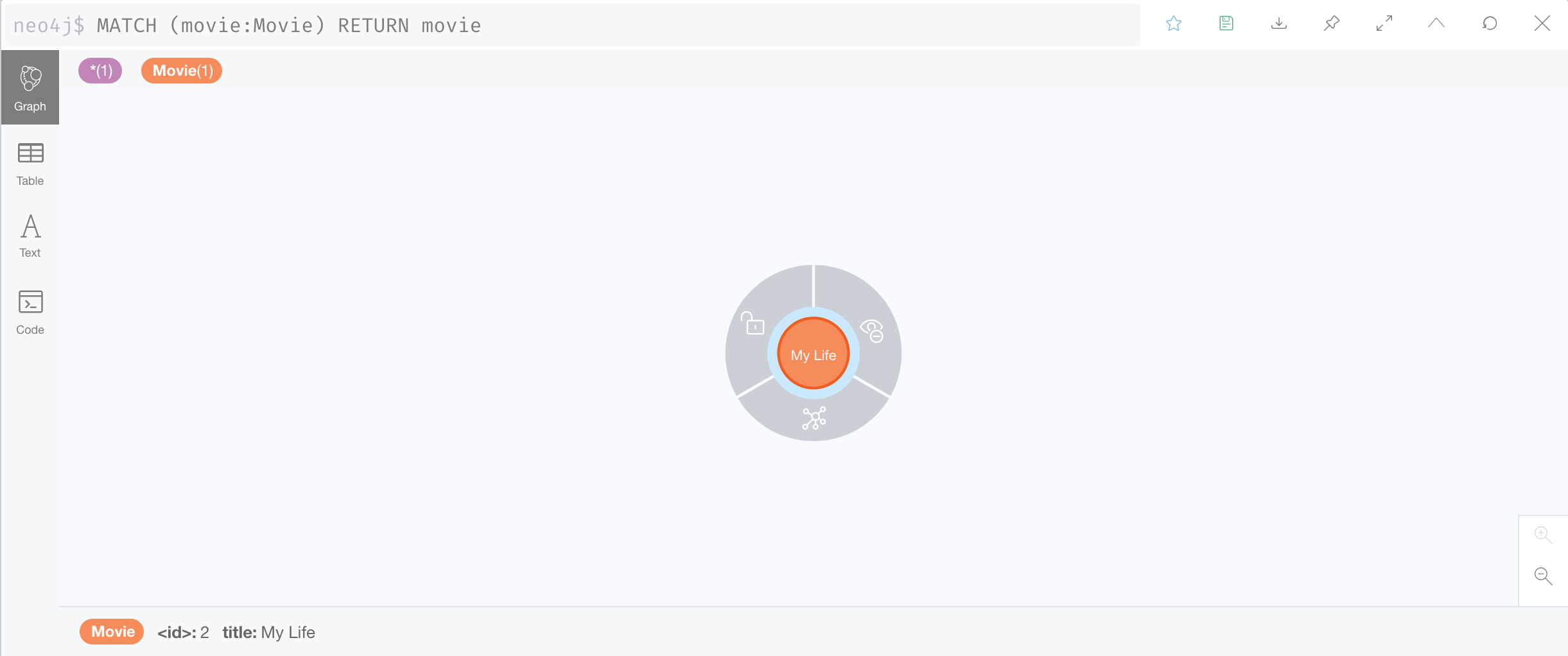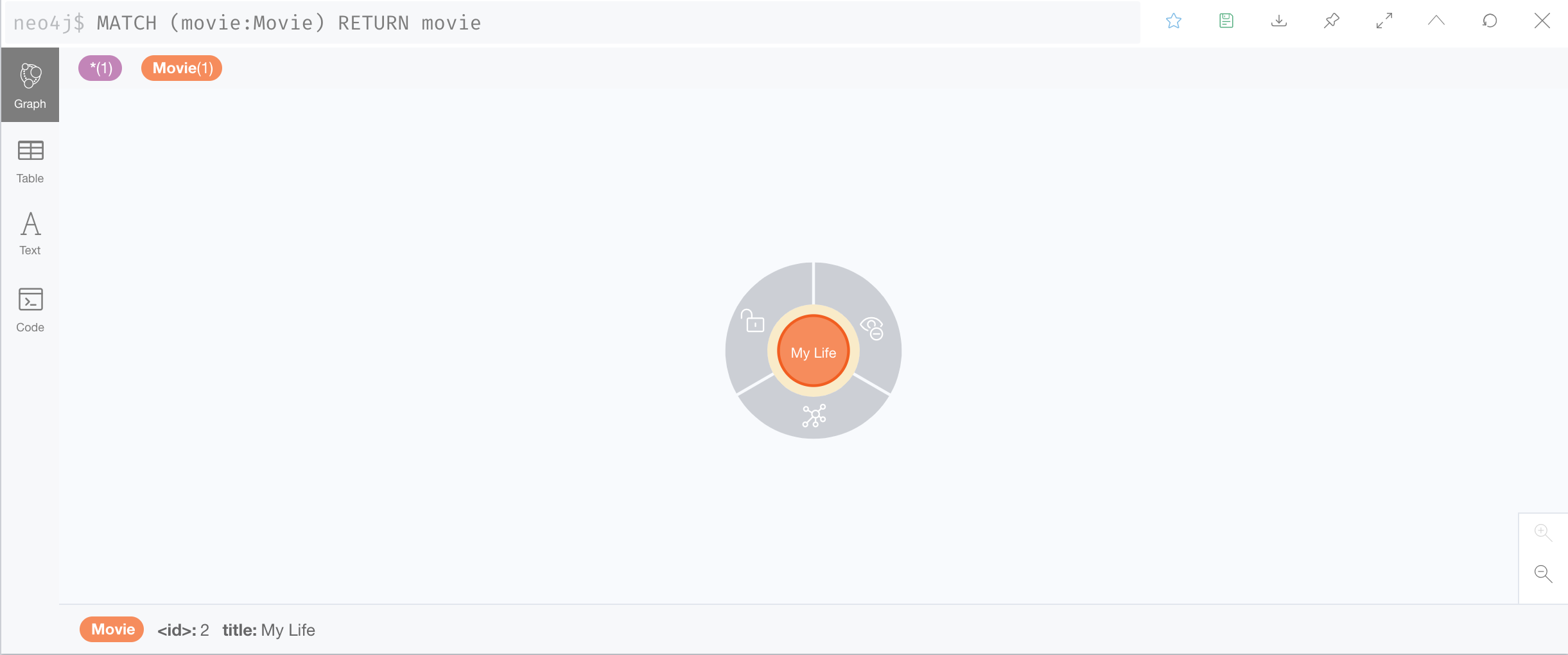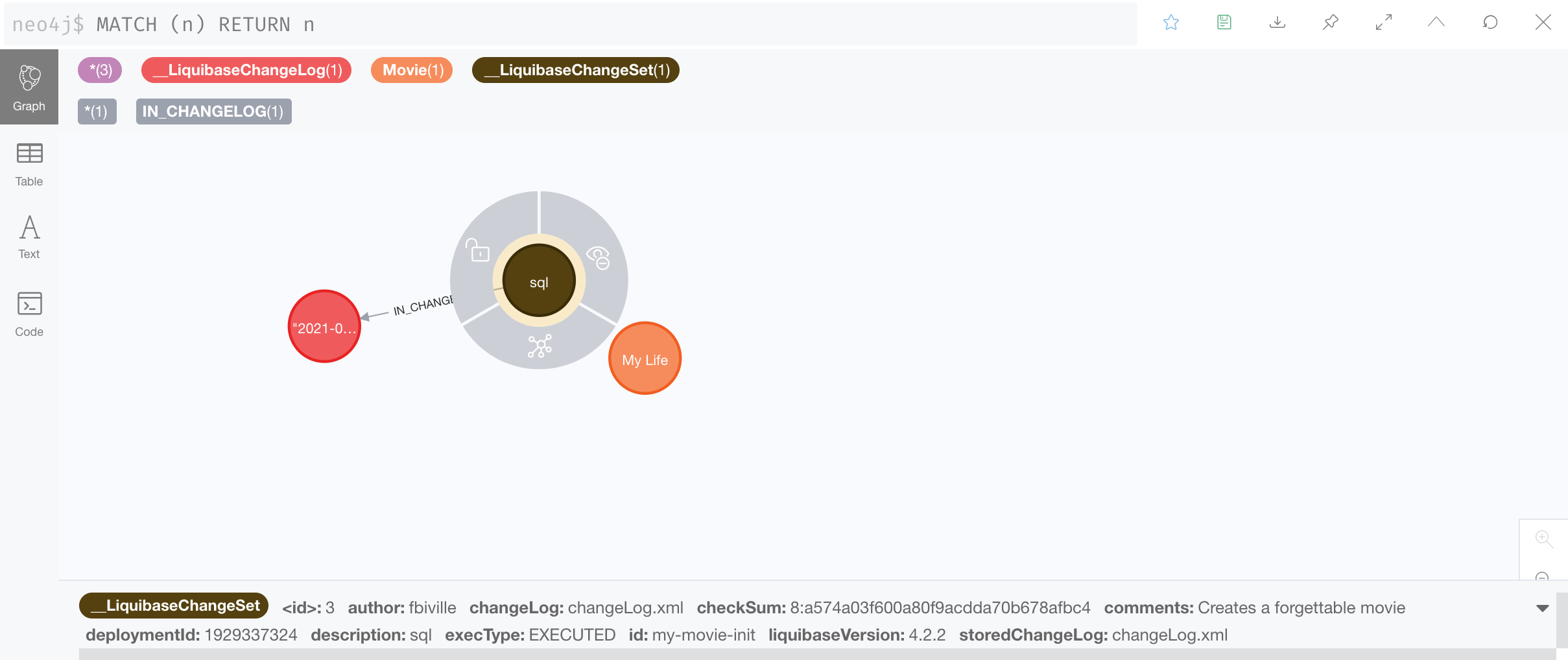Quick Start#
If you are not familiar with Liquibase concepts, please start here.
Setup#
The rest of this tutorial will assume a CLI installation, as well as a running Neo4j database. Please refer to the download section to install the extension.
There are several ways to install Neo4j:
- in the cloud ☁️ with Neo4j AuraDB
- in the cloud ☁️ with Neo4j Sandbox
- locally 🏠 with Neo4j Desktop
- locally 🏠 with Docker
From now on, the tutorial assumes Neo4j runs at the URI bolt://localhost, with the user neo4j and the very (not)
secure password changeme.
Change Log#
The rest of the tutorial assumes the change log is written in the XML file changeLog.xml, here are some of the
supported formats:
<?xml version="1.0" encoding="UTF-8"?>
<databaseChangeLog xmlns:xsi="http://www.w3.org/2001/XMLSchema-instance"
xmlns="http://www.liquibase.org/xml/ns/dbchangelog"
xmlns:neo4j="http://www.liquibase.org/xml/ns/dbchangelog-ext"
xsi:schemaLocation="http://www.liquibase.org/xml/ns/dbchangelog http://www.liquibase.org/xml/ns/dbchangelog/dbchangelog-latest.xsd">
<changeSet id="my-movie-init" author="fbiville">
<neo4j:cypher>CREATE (:Movie {title: 'My Life'})</neo4j:cypher>
</changeSet>
</databaseChangeLog>
--liquibase formatted cypher
--changeset fbiville:my-movie-init
CREATE (:Movie {title: 'My Life'})
{"databaseChangeLog": [
{"changeSet": {
"id": "my-movie-init",
"author": "fbiville",
"changes": [
{"cypher": "CREATE (:Movie {title: 'My Life', genre: 'Comedy'})"}
]
}}
]}
databaseChangeLog:
- changeSet:
id: my-movie-init
author: fbiville
changes:
- cypher: 'CREATE (:Movie {title: ''My Life'', genre: ''Comedy''})'
This creates a node with the label Movie and one property, whose key is title and valued with the string My Life.
Tip
If you are not familiar with these graph concepts, learn more here.
Dry Run#
This is the updateSQL command (a less RDBMS-centric name is under consideration).
Executing a dry run is a good way to detect errors early, before the changes are persisted to the database.
This displays all the queries that would be executed against Neo4j if it were a normal execution.
liquibase --url jdbc:neo4j:bolt://localhost \
--username neo4j \
--password changeme \
--changeLogFile changeLog.xml \
updateSQL
The (truncated) output looks like:
Liquibase Community 4.33.0 by Datical
####################################################
## _ _ _ _ ##
## | | (_) (_) | ##
## | | _ __ _ _ _ _| |__ __ _ ___ ___ ##
## | | | |/ _` | | | | | '_ \ / _` / __|/ _ \ ##
## | |___| | (_| | |_| | | |_) | (_| \__ \ __/ ##
## \_____/_|\__, |\__,_|_|_.__/ \__,_|___/\___| ##
## | | ##
## |_| ##
## ##
## Get documentation at docs.liquibase.com ##
## Get certified courses at learn.liquibase.com ##
## Free schema change activity reports at ##
## https://hub.liquibase.com ##
## ##
####################################################
Starting Liquibase (version 4.33.0)
-- *********************************************************************
-- Update Database Script
-- *********************************************************************
-- Change Log: changeLog.xml
-- Against: neo4j@jdbc:neo4j:bolt://localhost
-- Liquibase version: 4.33.0
-- *********************************************************************
[...]
-- Changeset changeLog.xml::my-movie-init::fbiville
CREATE (:Movie {title: 'My Life'});
[...]
Liquibase command 'updateSQL' was executed successfully.
Run#
This is the update command.
liquibase --url jdbc:neo4j:bolt://localhost \
--username neo4j \
--password changeme \
--changeLogFile changeLog.xml \
update
The output should be similar to:
Liquibase Community 4.33.0 by Datical
####################################################
## _ _ _ _ ##
## | | (_) (_) | ##
## | | _ __ _ _ _ _| |__ __ _ ___ ___ ##
## | | | |/ _` | | | | | '_ \ / _` / __|/ _ \ ##
## | |___| | (_| | |_| | | |_) | (_| \__ \ __/ ##
## \_____/_|\__, |\__,_|_|_.__/ \__,_|___/\___| ##
## | | ##
## |_| ##
## ##
## Get documentation at docs.liquibase.com ##
## Get certified courses at learn.liquibase.com ##
## Free schema change activity reports at ##
## https://hub.liquibase.com ##
## ##
####################################################
Starting Liquibase (version 4.33.0)
Liquibase: Update has been successful.
Look at the database and check whether the Movie node has been created.
Depending on your Neo4j setup, opening the Neo4j Browser will consist in either:
- going to Neo4j Aura, locating your instance and clicking on the "Open with" button and selecting Neo4j Browser
- going to Neo4j Sandbox, locating your instance and clicking on the "Open" button
- directly browsing http://localhost:7474 (Docker)
- opening Neo4j Desktop, selecting your project and clicking on the "Open" button
Once Neo4j browser is open, you can run the MATCH (movie:Movie) RETURN movie query, and you should see the same result as below:

What happens if the same update command runs again?
Let us find out:
liquibase --url jdbc:neo4j:bolt://localhost \
--username neo4j \
--password changeme \
--changeLogFile changeLog.xml \
update
The output should be similar to:
Liquibase Community 4.33.0 by Datical
####################################################
## _ _ _ _ ##
## | | (_) (_) | ##
## | | _ __ _ _ _ _| |__ __ _ ___ ___ ##
## | | | |/ _` | | | | | '_ \ / _` / __|/ _ \ ##
## | |___| | (_| | |_| | | |_) | (_| \__ \ __/ ##
## \_____/_|\__, |\__,_|_|_.__/ \__,_|___/\___| ##
## | | ##
## |_| ##
## ##
## Get documentation at docs.liquibase.com ##
## Get certified courses at learn.liquibase.com ##
## Free schema change activity reports at ##
## https://hub.liquibase.com ##
## ##
####################################################
Starting Liquibase (version 4.33.0)
Liquibase: Update has been successful.
Look at the database again.

Nothing changed!
It actually works by design. Indeed, change sets are incremental by default, i.e. they run only once.
The database actually contains more than 1 node:

The plugin stores the change log history into the same database. That is how Liquibase remembers not to re-run an incremental change set.
Avid readers may also have noticed a checkSum attribute on the __LiquibaseChangeSet node.
That attribute makes sure its change set has not changed since the last run.
Learn more by reading the reference documentation.